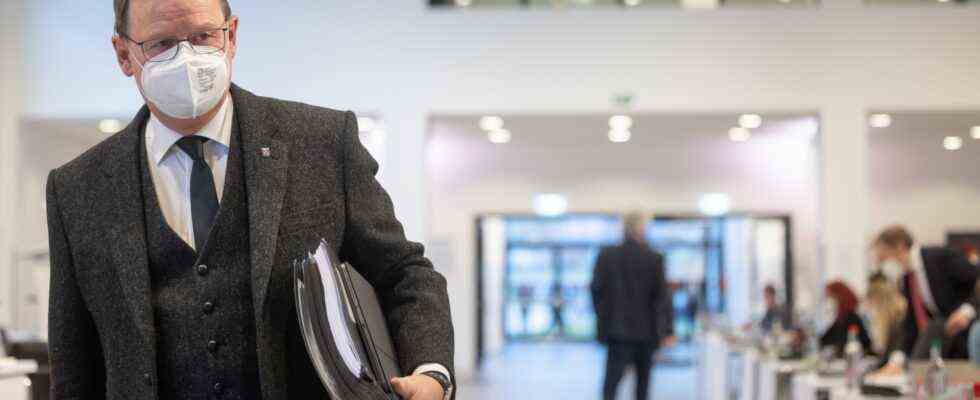FAQ
Status: 07/16/2021 4:53 p.m.
Thuringia will not elect a new state parliament in autumn as planned. Why did the new election fail – and how should it go on now? The most important questions and answers.
Why is?
Since the scandal surrounding the short-term Prime Minister Thomas Kemmerich, Thuringia has been ruled by a minority government made up of the Left, SPD and Greens – which the CDU supports in selected political projects. With the so-called stability mechanism, the parliamentary groups wanted to secure the political capacity to act. The pact allowed majorities in votes in parliament on a case-by-case basis.
However, he also provided for new elections, which should take place after the state budget for 2021 has been approved. Since this was not possible in the Corona crisis, September 26th – the day of the federal election – was set as the new date. For this, however, the state parliament must be dissolved with a two-thirds majority.
At the beginning of July, the four parliamentary groups finally submitted the motion to dissolve the state parliament. It was signed by 30 members of the SPD, CDU, Left and Greens.
The four parties have a total of 63 MPs in the Thuringian state parliament, 60 votes are required. Next Monday, a special session should vote for the self-dissolution. That would have been the last possible time for the deadline in autumn to meet the constitutional deadlines.
Lars Sänger, MDR, on the failure of the state election in Thuringia
tagesschau24 2 p.m., July 16, 2021
Why was the application withdrawn now?
Six of the 63 MPs from the ranks of the Red-Red-Green and CDU had recently stated that they did not support the dissolution request: Four CDU MPs – Michael Heym, Christina Tasch, Maik Kowalleck and Jörg Kellner – refused on the grounds that they were could see “no weighty reason” for dissolving the state parliament. In the meantime, Ute Bergner – at that time still a member of the FDP party – announced that he would vote for the dissolution of the state parliament.
That would have secured the 60 votes. This also became obsolete at the end of June. The two left-wing MPs Knut Korschewsky and Kati Engel refused to dissolve the state parliament with votes from the ranks of the FDP or the AfD. They demand that the CDU stick to the agreement. In addition, a member of the Left parliamentary group should be absent from the special session on Monday because of a hospital stay after a fall injury.
As the parliamentary groups of the Left, SPD and Greens announced, Left parliamentary group leader Steffen Dittes withdrew his signature on the motion to dissolve parliament today. This means that the application is no longer valid because the number of 30 signatures is no longer reached.
Dittes justified the move with the lack of a majority. The decision is responsible. Democratic actors should not become the AfD’s plaything. The Greens expressed a similar opinion, the SPD regretted the decision.
How were the reactions?
AfD parliamentary group leader Björn Höcke accused the left, the SPD, the Greens and the CDU of “lying boldly in the face” of the voters. Prime Minister Bodo Ramelow made Thuringia a mockery. He must ask the question of confidence. CDU parliamentary group leader Mario Voigt accused the left of having taken the Thuringians away from new elections. The majority in the state parliament said that the Left Party did not want to use them. This would risk a standstill. In his opinion, there could be no new stability agreement after the parliamentary summer break.
SPD parliamentary group leader Matthias Hey, in turn, made the CDU jointly responsible for the failure of the new election. The decision to withdraw the motion is “the most honest and clearest alternative when it is certain that the votes are not enough for a two-thirds majority,” said Hey.
FDP parliamentary group leader Kemmerich called on the parties to look ahead. The liberals are ready to contribute constructively to parliamentary work.
And now?
One thing is certain: there will be no special session on Monday to dissolve the state parliament. So there will be no Thuringia election on September 26th. The stability pact expires at the beginning of the parliamentary summer recess. The CDU is apparently no longer ready to enter into such a stability pact, analyzes Lars Sänger from MDR. However, there are signals from the FDP to want to build bridges. The five members of the FDP could possibly contribute to obtaining a majority – for example with the budget, says Sänger.
The co-chair of the Left Party in the country, Heike Werner, has already announced that she will talk to the CDU and FDP about whether voting can be done in parliament with changing majorities. It is important that there is now a certain amount of trust between red-red-green and CDU and FDP. “I hope that what has been going on here will settle over the summer break,” she said.
What does that mean for Bodo Ramelow?
It is unclear how it will continue with Prime Minister Ramelow. To MDR-Information, it is unlikely that he will face a vote of confidence. Thuringia takes over the Federal Council presidency in autumn. Ramelow would then be the first Federal Council President with a party book of the left. “He won’t let this chance be missed,” says Singer. “I don’t think there will be a discussion about Bodo Ramelow.”
With information from Sebastian Großert, MDR,
and dpa

